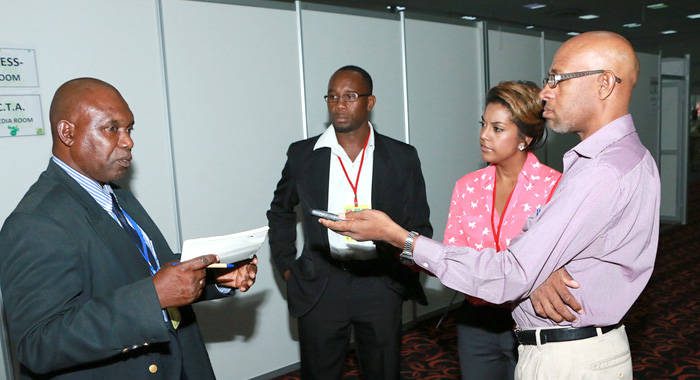By Kenton X. Chance
PARAMARIBO, Suriname — Praedial larceny should be taken as seriously as climate change, as the theft of agricultural produce can have a deleterious impact on the regional economy and the health of its citizens.
Reuben Robertson, Food and Agriculture Organisation technical advisor to the Organisation of Eastern Caribbean Sates (OECS) told reporters at Caribbean Week of Agriculture that annual loss as a result of praedial larceny range from US$2.3 million in SVG to US$300 million in Belize.
“If you look at the 300 million and you compare the GDP contribution of agriculture, if you add the OECS, Trinidad and Tobago, the extent of the agriculture income is not as great as the 300 million lost,” he said.
“That, to me, is a problem which needs a lot of urgent attention,” said Robertson, a former chief agricultural officer in St. Vincent and the Grenadines (SVG).
“If we are to develop effective policies for sustainable agricultural production, just like how we are talking about climate change and mitigation against climate and governments putting programmes in place to reduce risk, praedial larceny, to me, is of such high importance that we need to take it just as serious as we take climate change,” Robertson said on the sideline of Caribbean Week of Agriculture.
Robertson, whose work for the FAO is focused on SVG, St. Lucia and Grenada, said praedial larceny has resulted in the bank foreclosing on farmers who were unable to repay loans.
“Praedial larceny has resulted in a number of poor people’s children dropping out of school because the goats and sheep and the crops that they had to sell to buy the uniform [were stolen],” Robertson said.
He pointed out that there is “no backup system to say you have your crops registered, you can bring the police to verify or certify and the agricultural officer to quantify what your gains would have been, so you can go to an institution and say I can recover 20, 30, 40 per cent of what I had.
“So, to me, having a crop insurance, … or some fund that remits some level of contribution to the farmer in instances where you have praedial larceny will be a good thing for the sustainability of agriculture,” he said.
Robertson also spoke of the impact of praedial larceny on public health, saying, “I think it is perhaps one of the most serious, I would say, deadly aspects of praedial larceny.”
He said thieves may steal and sell produce not intended or ready for human consumption.
“We have a number of incidents where a number of consumers and the members of their families actually died of leptospirosis and thinking it is flu or some other symptom. And we are downplaying this,” he said.
Robertson also said persons may become infected when they buy meat of animals that farmers are treating for various illnesses, and still have elements of the medicine in their systems.
“And, again, that can have deleterious effects on human health.”
But Robertson said praedial larceny is an international problem that is widespread in the Caribbean.
He said that while countries have passed legislation, there is little enforcement, but added that in Jamaica, Trinidad and Tobago, SVG, and Antigua there are lessons learnt from some of the steps taken in enforcing the legislation, including public awareness, ensuring that farmers are registered, putting in place rural constables to police the hotspots.
“Some have even gone to the extent that they are using high technology,” Robertson said, but added that some farmers and their employees are involved in praedial larceny.
Regarding legislation, Robertson said one of the “fundamental flaws” in the law in some countries is that a person has to steal a certain quantum with a particular value to be prosecuted under the praedial larceny laws.
And even where there are convictions, Robertson said that his “biggest problem” is that in some jurisdictions, the money can be passed on to the owner of the produce, but that has to be decided by the court.







This man was the chief agricultural officer in SVG and never put things in place to try and deal with the problems he talking about. Typical square peg in round hole.
We should always get our facts straight before posting statements. Do you realize that this same man along with the present minister of agriculture, were the ones who piloted the Agriculture, Produce and Livestock (Prevention of Theft) Act 2007? Assistance was also received from the police and Cabinet. At that time Mr. Caesar was still attached to the leglisative arm of the government.
So now they know this what is being put in place after all the talk? Numerous suggestions were made to the Ministry of agriculture in SVG with zero response this far. It is full time we arrest this ole talk and do something.
1. What is the sense of issuing farmers cards if anyone can sell produce without records or a requirement to show a farmers card?
2. Why can we not get the Ministry to spearhead a database of livestock supported by individual animal identification codes?
3. Why did the farmer’s support company not honor requests for investment in farm security?
We should always get our facts before making unsubstantiated claims. Do you realize that the “square peg” along with the present minister of agriculture piloted or spearheaded the Agriculture Produce and Livestock (Prevention of Theft ) Act of 2007? They also received valuable assistance from the police and the Cabinet. At that time, Mr. Caesar was still attached to the legislative arm of government.
So the comment was removed twice? Your stripes are showing. LOL